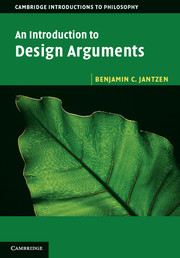Book contents
- Frontmatter
- Dedication
- Contents
- List of figures and tables
- Preface
- 1 Introduction
- 2 Preliminaries
- 3 Arguments from antiquity
- 4 Medieval arguments
- 5 The golden age of natural theology
- 6 Unusual design arguments
- 7 Hume
- 8 Paley
- 9 Darwin
- 10 Loose ends
- 11 The modern likelihood argument
- 12 Intelligent design I: irreducible complexity
- 13 Intelligent design II: specified complexity
- 14 What is complexity?
- 15 Supernatural agents and the role of laws
- 16 A brief survey of physical law
- 17 Fine tuning I: positive arguments
- 18 Fine tuning II: objections
- 19 Conclusion
- Bibliography
- Index
5 - The golden age of natural theology
Published online by Cambridge University Press: 05 June 2014
- Frontmatter
- Dedication
- Contents
- List of figures and tables
- Preface
- 1 Introduction
- 2 Preliminaries
- 3 Arguments from antiquity
- 4 Medieval arguments
- 5 The golden age of natural theology
- 6 Unusual design arguments
- 7 Hume
- 8 Paley
- 9 Darwin
- 10 Loose ends
- 11 The modern likelihood argument
- 12 Intelligent design I: irreducible complexity
- 13 Intelligent design II: specified complexity
- 14 What is complexity?
- 15 Supernatural agents and the role of laws
- 16 A brief survey of physical law
- 17 Fine tuning I: positive arguments
- 18 Fine tuning II: objections
- 19 Conclusion
- Bibliography
- Index
Summary
The rise of natural theology
From among the sparse offerings of the Middle Ages, I presented only the design argument of Thomas Aquinas as worth a close examination. However, there is one more medieval work we ought to consider, if only for its significance as a transitional text. I am referring to a book written in the 1430s by a Spanish professor of medicine, philosophy, and theology named Raymond Sebonde. The importance of this book is not to be found in the specific design argument it contains. In fact, unlike what we saw in the work of Aquinas, it’s no straightforward affair to extract a clear argument from Sebonde. His book was never translated from its original Latin into English (though Montaigne did translate it into French), and those few who have undertaken to study the book in its original form suggest it is almost unreadable. It contains some 330 chapters of poorly rendered and heavily abbreviated Latin. Nonetheless, we can charitably reconstruct the following argument from the third chapter of the text. The “book of nature” is composed of creatures that can be sorted into four “degrees” or “grades” based on their possession or lack of “existence, life, sensation, intelligence, and free will.” In the first grade are things like rocks that have only existence. In the second grade are things like plants that have existence and life, but nothing else. The animals, the third grade of creature, have everything excepting intelligence and free will. Mankind is in a grade of its own, possessing the whole package of characteristics. Now, says Sebonde, the presence of these characteristics must have a cause. The cause cannot be humanity itself – we certainly didn’t give ourselves intelligence or free will – or any of the lower grades of creatures. Thus, the cause must be something with more numerous and more powerful characteristics than humans. Furthermore, the hierarchical order in the grades of creatures – man above animals above plants above minerals – could only result from the intention of an intelligent creator. Lastly, we know there’s only one creator since the characteristics are the same for each grade in which they appear and therefore must have the same cause. That intelligent, powerful cause is God.
- Type
- Chapter
- Information
- An Introduction to Design Arguments , pp. 58 - 77Publisher: Cambridge University PressPrint publication year: 2014



